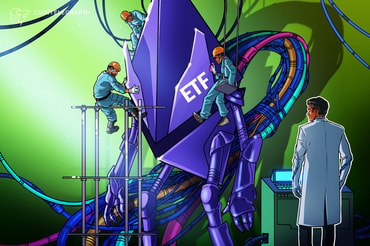Protocol Village: Axelar Says New Mobius Development Stack to Support Thousands of Heterogeneous Blockchains

Election 2024 coverage presented by
Axelar, a blockchain interoperability project, has launched Mobius Development Stack, described as “a reimagined Web3 design space,” according to the team: “Axelar Mobius Development Stack (MDS), an open interoperability platform for decentralized applications, is live on mainnet. Upcoming L1 launches include Flow, Hedera, Solana, Sui, XRP Ledger. MDS is a new interoperability standard: Advanced token utility, infinite security and scalability.” Sergey Gorbunov, CEO, Interop Labs, said in a statement that “MDS is the first architecture that scales to support thousands of heterogeneous blockchains.”
Polyhedra Network, a blockchain project specializing in zero-knowledge (ZK) proofs, released the first set of data from its new Proof Arena, a benchmarking platform designed to evaluate and compare different ZK provers. According to the team, “The data includes comparisons of provers from Polyhedra, Polygon, Linea and StarkWare – Expander, Plonky3, GNARK, Halo2 respectively. Results: the Expander prover is significantly faster in terms of proof generation time and peak memory; Plonky3 achieves stellar performance in terms of setup and verification time, and GNARK has the smallest proof size.” [EDITOR’S NOTE: Please see our exclusive feature story on Proof Arena, published in July.)
Aptos Labs, a blockchain developer, has agreed to acquire HashPalette Inc., a subsidiary of HashPort Inc. and developer of the Palette blockchain. According to the team: “As part of the agreement, HashPort will migrate the Palette Chain and HashPalette’s applications into the Aptos Network, including EXPO2025 DIGITAL WALLET for Expo 2025, Osaka, Kansai, Japan. This acquisition is a key component of Aptos Labs’ strategy to expand its footprint in Asia and bring the high-performing Aptos blockchain to one of the world’s most innovative digital economies.” According to CoinGecko, Palette’s PLT token has a fully diluted valuation of $23 million. (APT)
BOB, describing itself as a hybrid layer-2 project powered by Bitcoin and Ethereum, announced the integration of its one-click Bitcoin staking solution, BOB Stake, into the Everstake platform. According to the team: “This collaboration will provide up to 900,000 users – both retail and institutional – easy access to secure Bitcoin staking. Everstake, known for its reliable staking services, aims to enhance user interactions with Bitcoin. The integration simplifies the staking process and opens up DeFi opportunities, making it particularly beneficial for institutional investors.” BOB stands for “Build on Bitcoin.”
Sui, a blockchain built around the Move smart-contracts programming language, has become the first layer-1 project to drop the outdated Border Gateway Protocol (BGP), and is now running Scion’s cutting-edge network architecture. According to the team: “The upgrade provides validators with a comprehensive defense against internet routing attacks that have caused significant downtime on other networks, making Sui even more secure. Implementing Scion enables fallback between networks, giving Sui resilience to network hijacking and DDoS attacks. Validators maintain consensus during attacks, improving epoch rewards. Full nodes benefit from better state sync, avoiding bottlenecks and retry delays.” (SUI)
Poland’s second-largest bank, Bank Pekao S.A., has partnered with Aleph Zero to launch Archiv3, “a project to tokenize and preserve renowned Polish artworks,” according to the team: “Using Aleph Zero’s eco-friendly blockchain, digital reproductions of masterpieces by artists like Jan Matejko and Stanisław Wyspiański have been minted as NFTs and stored in the Arctic World Archive for long-term preservation. This marks the first use of blockchain to safeguard historical art in the AWA, combining technological innovation with cultural preservation.”
Taurus, a digital asset-platform to custody, issue and manage cryptocurrencies, and Chainlink Labs, a blockchain oracle developer, announced a collaboration to accelerate tokenized asset adoption by financial institutions. According to the team: “Taurus will use Chainlink to enrich tokenized assets with offchain data and enable cross-chain interoperability. This includes integrating Chainlink Data Feeds, Proof of Reserve and CCIP. The collaboration aims to accelerate time-to-market for tokenized assets, increase liquidity and enhance cross-chain security.”
Holonym Foundation, a project for decentralized digital identity solutions, announced a partnership with Renzo Protocol, a liquid restaking protocol. According to the team: “The Renzo Protocol platform leverages Ethereum and EigenLayer’s robust infrastructure and node operators to support the secure creation of Human Keys on Holonym’s Mishti Network. This enables users to generate keys using anything from biometrics to social accounts, ensuring both flexibility and security.”
Key Difference Labs, a venture capital firm, is partnering with Lisk, an Ethereum layer-2 project, to launch the Lisk Pioneer Program, an incubator program for projects looking to build on the Lisk blockchain. According to the team: “Benefits Include Funding: $100,000 per project (total of 20 projects); Mentorship: Guidance from industry leaders with a proven track record; and Exposure: Access to events, marketing support, and networking opportunities. This program is a four-month go-to-market process. Startups will receive expert guidance on tokenomics, raising capital, partnerships, community growth, and assistance with exchange listings.”
Cookbook.dev announced it has partnered with 30 blockchain networks and projects, including Monad, Berachain, Polygon, Sui, Superfluid, Linea, Camp, Celo, Fuel, Web3.js, Pyth Network and Tangle Network, who have fully integrated the Cookbook.dev suite into their documentation. According to the team: “Cookbook.dev’s Web3 developer system includes a comprehensive smart contract library, AI-powered ChefGPT assistant, coding playground, analytics dashboard and more. Cookbook.dev aims to help onboard more devs, deploy more projects more quickly and accelerate their growth.”
Protocol Village is a regular feature of The Protocol, our weekly newsletter exploring the tech behind crypto, one block at a time. Sign up here to get it in your inbox every Wednesday. Project teams can submit updates here. For previous versions of Protocol Village, please go here.
Edited by Bradley Keoun.
Disclosure
Please note that our privacy policy, terms of use, cookies, and do not sell my personal information have been updated.CoinDesk is an award-winning media outlet that covers the cryptocurrency industry. Its journalists abide by a strict set of editorial policies. CoinDesk has adopted a set of principles aimed at ensuring the integrity, editorial independence and freedom from bias of its publications. CoinDesk is part of the Bullish group, which owns and invests in digital asset businesses and digital assets. CoinDesk employees, including journalists, may receive Bullish group equity-based compensation. Bullish was incubated by technology investor Block.one.
Bradley Keoun is the managing editor of CoinDesk’s Tech & Protocols team. He owns less than $1,000 each of several cryptocurrencies.

Published on Other News Site












